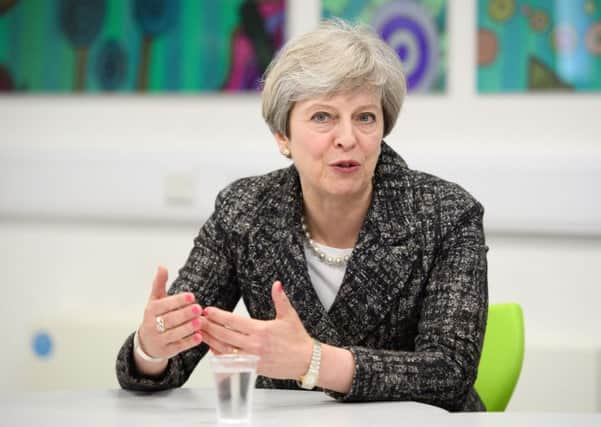Theresa May came along as the right leader at the right time for Britain


You will have seen it happen with sports teams that were languishing far below their potential, until a new manager began to transform their fortunes.
It happens on occasion with a company that is in difficulties or a school that is struggling until a dynamic chief executive or head teacher arrives to turn things round.
Advertisement
Hide AdAdvertisement
Hide AdAnd it happens with political parties. Theresa May seems such a person.
She was always a contender to succeed David Cameron as Conservative Party leader, but never a front-runner.
If it is true, as reported, that George Osborne on occasion would put Mrs May in her place in Cabinet then presumably the then Chancellor had little fear that the then Home Secretary would beat him to Downing Street.
But she did, and one of the first brutal decisions she took as prime minister was to sack Mr Osborne.
Advertisement
Hide AdAdvertisement
Hide AdIt soon became clear Mrs May had been the right choice to lead the Tories. It is hard to believe now that the job almost went to someone as unknown as Andrea Leadsom or to men as gifted but unpredictable as Michael Gove and Boris Johnson.
Mrs May emerged as the sceptical Remainer, who could be trusted by both sides of the Brexit divide – someone who was mildly Eurosceptic but also pragmatic.
She made clear from the beginning of her bid for the leadership that she would not hesitate in implementing the referendum decision, even though she had voted against EU withdrawal.
None of this proves that Theresa May is a great political leader – it is much too early to judge if she is so.
Advertisement
Hide AdAdvertisement
Hide AdBut she has qualities that ought to be pre-requisites in a prime minister but seem increasingly scarce.
She is an immediate break with the political cult of youth: David Cameron and Tony Blair became prime minister at the age of 43, while Barack Obama became president of the United States aged 47. At times the inexperience of all three men was painfully apparent.
Mrs May became prime minister in her 60th year.
She has not demeaned herself by trying to be popular with young people.
Voters should be immediately wary of a politician who tries to be cool, the most embarrassing example of which was Tony Blair – who was palsy with the rock band Oasis, who was photographed entering Downing Street with a guitar and who boasted of his sex life with Cherie.
Mrs May seems unlikely to behave in that way.
Advertisement
Hide AdAdvertisement
Hide AdShe seems less driven by public opinion than were Mr Blair and Mr Cameron. Leaders should lead yet seem increasingly loathe to do so in western democracies, such is the fear of losing office.
We have government by focus group and consultation and equality impact assessment. If ever a minister does take a bold decision they might lose a judicial review of that decision in the courts.
Mrs May has at times broken free of consensus, be it arguing for grammar schools (a reasonable response to the disaster of comprehensives) to almost pulling the plug on the Hinckley nuclear plant.
After being Home Secretary for six years, one of the toughest ministerial jobs (a notable achievement in itself), Mrs May began to think that the court from which Britain should withdraw was not the European Union’s Court of Justice but the jurisdiction of the European Court of Human Rights.
Advertisement
Hide AdAdvertisement
Hide AdWhen I see the way the ECHR is used here to constrain the fight against terrorism, it seems clear to me that she was right at least to consider such a course.
She has also been bold with Brexit too.
In the weeks after the referendum I assumed that the UK would quietly pursue the Brexit-lite Norway model, of continued single market membership but the PM did not go down that route.
Mrs May stands up for Britain’s Christian heritage and such values, stances that ought not to be in doubt but are so increasingly in a PM.
She is, in summary, a break with feebleness.David Cameron in fairness did some of these things too, but Mrs May shattered his chumocracy and the grim idea that only smoothies who network reach the top. She did so through application.
Advertisement
Hide AdAdvertisement
Hide AdThis is not to say she is fearless. There are chronic problems facing Britain that no politicians seem willing to tackle, such as our ever rising debt, creaking NHS and vast pension liabilities. These will only be resolved if politicians risk major unpopular reforms and Mrs May has shown little appetite for that.
Perhaps if she gets a majority and clear five-year mandate that will change.
But amid opposition leaders such as Tim Farron and Jeremy Corbyn and global presidents such as Donald Trump and Francois Hollande, she seems a towering figure and a reassuring sign that there are still some sober, competent, serious and smart people in politics.